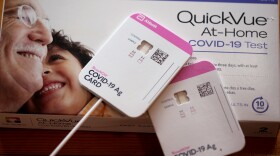The Round Rock Independent School District board has approved another mask mandate for students and staff. The 5-2 vote came after midnight early Thursday during a meeting punctuated by disruptions and protesters.
Under the new mandate, students, staff and visitors must wear masks on buses and indoors when 6 feet of distance cannot be maintained. They can remove their masks when seated for lunch or while outdoors.
Masks can also be removed for athletics, fine arts and physical education when allowed by an instructor, director or coach.
The new mandate uses a "mask matrix," connecting the mask requirement to COVID-19 risk stages determined by Williamson and Travis counties' health districts. Masks will be required when COVID-19 transmission is at its highest levels, and they will become optional as community spread slows.
The new mandate also gives RRISD Superintendent Hafedh Azaiez the authority to change the mask mandate if legal action or the Texas Education Agency requires.
The school board initially put a mask mandate in place on Aug. 18, and it expired on Friday. Board members were supposed to vote on renewing the mandate last week, but that meeting quickly devolved into chaos. Members of the public showed up, and there was not enough seating for everyone, which sparked outrage. The meeting was postponed to last night.
The legality of RRISD's mask mandate is playing out in the courts. Attorney General Ken Paxton has filed a lawsuit against the district for enforcing a mandate, which he says goes against an executive order from Gov. Greg Abbott banning mask mandates in schools.
A Williamson County judge also signed an order last Thursday temporarily prohibiting the district from enforcing the mask mandate. But on Friday, the Third Court of Appeals issued a hold on the order, which the district says allows it to continue with a mask requirement.
Students and staff may opt out of the mask requirement for health or developmental reasons through a form on the district website.
Trustee Amber Feller voted in favor of the mask mandate. Because the requirement depends on the level of COVID transmission, she said she sees this mandate as a compromise in a situation that did not appear to have one.
"Every child deserves to be able to attend school in a healthy environment," she said. "And we do have a small portion that COVID is very, very dangerous for. Is it a very small fraction of our population? Absolutely. But every one of them matters."
Trustees Mary Bone and Danielle Weston voted against the mandate. Bone said she would not support the mandate because she said it will require spending on legal fees for lawsuits against the district. She hoped that money could be used toward more COVID-19 mitigation strategies.
"And instead we just keep getting ourselves into litigation," Bone said.
Emotions were high on both sides of the debate over implementing the new mandate. Many people showed up to speak during the public comments portion of the meeting, which stretched on for three hours. Some speakers shouted into the microphone, eliciting cheers and applause from the audience. School board President Amy Weir attempted to quiet them with her gavel, and at one point asked the crowd to use "jazz hands" instead of applause — to little avail.
On one side of the debate were parents urging the district to require masks so that students could safely remain in class. On the other were parents arguing a mask mandate was an infringement on students' rights.
There were also protests over the potential censure, or formal reprimand, of trustees Bone and Weston for their actions at the Sept. 14 school board meeting. At that meeting, not everyone who wanted to attend could fit inside because of social distancing requirements. Board members claim Bone and Weston continued interrupting the meeting by focusing on the space issue. They deemed Bone and Weston's actions disruptive and were going to vote on whether or not the two should be censured during Wednesday's meeting.
At that meeting, though, Weir said Bone and Weston filed a lawsuit against the other board members, preventing the board from being able to publicly discuss and vote on the censure.













